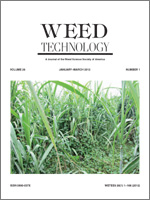Avena spp. are world weeds with many cases of evolved herbicide resistance. In Australia, Avena spp. (wild oat and sterile oat) are a major problem, especially in grain crops. Acetyl-CoA carboxylase (ACCase)–inhibiting herbicides have been used extensively since the late 1970s for Avena spp. control. However, continued reliance on these herbicides has resulted in the evolution of resistant Avena spp. populations. Resistance across many ACCase-inhibiting herbicides was characterized in four Avena spp. populations from the Western Australian grain belt. Dose–response experiments were conducted to determine the level of resistance to the aryloxyphenoxypropionates and cyclohexanediones and to the phenylpyrazoline herbicide pinoxaden. On the basis of resistance index values, all four resistant populations exhibited high-level diclofop resistance but varied in the level of resistance to other ACCase-inhibiting herbicides tested. It is evident that Avena spp. populations from the Western Australian grain belt have evolved resistance to a number of ACCase-inhibiting herbicides.
Nomenclature: Diclofop; pinoxaden; sterile oat, Avena sterilis L. AVEST; wild oat, Avena fatua L. AVEFA.





